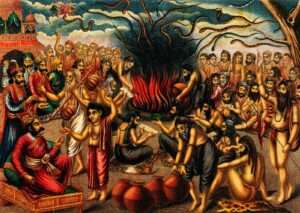
Astika, a young Brahmana with a controlled mind and a serene face, arrived on the same day that Takshaka, called by the Brahmanas by mantras, was about to be absorbed by the destructive fire.
Welcomed by all with courtesy and great respect, he addressed wise words to those present and praised the majesty of the sacrifice taking place. Hearing him talk with such eloquence and amiability, Janamejaya turned to the Brahmanas who assisted him in carrying out the sacrifice and told them:
“This young man demonstrates the knowledge of an elderly and experienced sage. I believe he is deserving of any honor. I wish to give him some gifts. Grant me permission to suspend the ceremony for a moment and then we will resume it”.
But the Brahmanas said:
“We don’t want to question the fact that any Brahmana who displays evident brahminic qualities always deserves absolute respect, and that the duty of every ruler is to grant him whatever he desires or needs. But, O king, we have a bad feeling. We suspect that this young man has come to hinder the fulfillment of the sacrifice. Do not promise him anything. This is not the right time to give charity. Your father’s killer, Takshaka, is coming and you will soon see him appear in the sky. In a few minutes your long-awaited revenge will have been achieved. Wait, then, because we have good reasons to believe that your generosity could prove fatal to you.”
Janamejaya was dumbfounded. He didn’t know what to do. He felt that those recommendations were right, yet one of his fundamental principles had always been to never flinch from the demands of a Brahmana, and he had never failed in what he considered his solemn vow.
Eventually, he decided to take a chance.
“Oh, young anchorite, ask me what you want and I’ll give it to you,” he said then.
At the same time, however, he begged the hotri to hurry, not to waste any more time, so as to speed up the arrival of Takshasa and his destruction in the flames.
And while Astika reflected, the gigantic Naga appeared, like a great black storm-bringer, still clinging to Indra. But when the two, like thunderbolts, were rushing in the direction of the sacred fire, verifying the imminent danger, Indra struggled and fled abruptly abandoning his friend to his fate. Janamejaya, excited, urged the priest to hasten the fall, while the young Brahmana watched peacefully. Then he said:
“Oh, glorious king, I desire neither riches nor honors; I only ask that this sacrifice be stopped immediately.”
At those words, Janamejaya was alarmed, and he replied:
“Oh, Brahmana, why do you want this? The death of that murderer is of fundamental importance to me, yet this is not of interest to you. I can give you enormous wealth, properties, even my entire kingdom, but let me have my revenge.”
Despite that, Astika repeated the request:
“I don’t need anything. Both wealth and temporal power are indifferent to me. All I ask is that this sacrifice be suspended forever.”
Janamejaya looked at the Brahmanas for advice and all agreed on what was right to do. They said:
“Oh, king, you have naively promised and now you can’t turn back. If you don’t want your pious acts to be immediately undone, and if you do not want to stain yourself with the shame of falsehood for breaking a promise, you must stop this yajna without further delay, even if your enemy is now close to his death.”
Reluctantly, Janamejaya ordered the suspension and Takshaka managed to save himself.
This is a section of the book “Maha-bharata, Vol. 1”.
To buy the complete book, click above
Post view 632 times



Leave a Reply